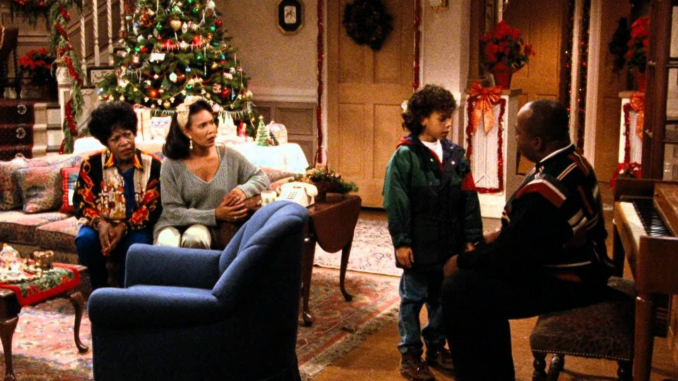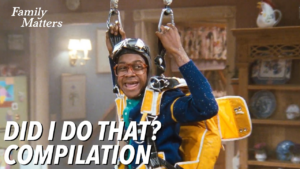
The history of television is filled with classic sitcoms that have stood the test of time, but among the most influential shows are those that showcased Black culture and talent. From the iconic slapstick humor of Family Matters to the heartfelt comedy of The Fresh Prince of Bel-Air, Black sitcoms have made an indelible mark on TV. These shows not only entertained millions but also highlighted important social issues, broke stereotypes, and created some of the most beloved characters in television history. Let’s dive into 10 Black sitcoms that made a lasting impact on the small screen.
1. The Fresh Prince of Bel-Air – A Cultural Milestone
When The Fresh Prince of Bel-Air first aired in 1990, no one could have predicted how influential the show would become. Starring Will Smith as a street-smart teenager from West Philadelphia sent to live with his wealthy relatives in Bel-Air, this sitcom explored themes like race, class, and identity. The show’s blend of humor and heart made it a hit, and Will Smith’s charismatic performance propelled him to superstardom. The Fresh Prince remains a cultural milestone, offering both laughs and life lessons, with iconic moments that still resonate with fans today.
2. Family Matters – The Quintessential Family Sitcom
While Family Matters started as a simple family-oriented show, it quickly evolved into a cultural touchstone. Centered around the Winslow family and their eccentric neighbor Steve Urkel, Family Matters became the platform for exploring everything from family dynamics to teenage struggles. But the real game-changer was Steve Urkel, played by Jaleel White. What was supposed to be a one-off character became the show’s main attraction, turning Urkel into one of the most iconic characters in TV history. Family Matters was groundbreaking in showing the value of family, the importance of humor in the face of adversity, and the power of an unlikely hero.
3. The Jeffersons – Breaking Down Barriers
As one of the first Black sitcoms to focus on a wealthy Black family, The Jeffersons broke new ground in the late 1970s. The show followed George and Weezy Jefferson as they moved to a high-rise apartment on Manhattan’s Upper East Side. The Jeffersons wasn’t just a show about wealth – it tackled social issues like racism, classism, and assimilation. With its bold approach to race and class, the show paved the way for future sitcoms to explore complex societal themes while still delivering plenty of laughs.
4. Good Times – A Show That Told It Like It Was
Good Times gave viewers an honest look at the challenges faced by an African-American family in Chicago during the 1970s. The show, which focused on the Evans family’s efforts to navigate poverty, racism, and social inequality, tackled tough topics with humor and humanity. Led by James and Florida Evans, played by John Amos and Esther Rolle, Good Times became a groundbreaking show that didn’t shy away from the realities of life for Black families, providing representation and a voice for a demographic often underrepresented on TV.

5. Martin – The Comedic Genius of Martin Lawrence
When Martin debuted in 1992, it became an instant hit, thanks to the comedic genius of Martin Lawrence. The show followed the antics of Martin Payne, a radio host with a sharp wit and an unforgettable array of characters. Martin played several roles on the show, including his long-suffering girlfriend Gina, his best friend Cole, and his zany alter-ego, Sheneneh. Martin was revolutionary in showcasing Black life in a comedic, relatable way while exploring relationships, career struggles, and friendship with a unique sense of humor.
6. Living Single – The Original Friends
Before Friends became a global phenomenon, there was Living Single. Premiering in 1993, Living Single featured a group of Black 20-somethings living in Brooklyn and navigating love, work, and friendship. With characters like Khadijah James (Queen Latifah), Synclaire James (Kim Coles), and Regine Hunter (Kim Fields), the show highlighted the joys and struggles of professional and personal life, offering viewers a fun and authentic representation of Black women in the ’90s. While Living Single is often credited as an influence on Friends, it was also groundbreaking in its own right for showcasing a diverse cast and a variety of experiences.
7. A Different World – A Show That Redefined Campus Life
Spinning off from The Cosby Show, A Different World became its own cultural force. The series focused on the lives of students at a fictional historically Black college, Hillman College, and addressed topics like race, relationships, social issues, and identity in a college setting. With standout performances from Jasmine Guy (Whitley Gilbert) and Kadeem Hardison (Dwayne Wayne), the show captured the essence of young adulthood and the complexities of balancing personal and academic growth. A Different World also became a launching pad for discussions about higher education for Black students and the importance of HBCUs in shaping the next generation.
8. 227 – A Slice of Urban Life
Premiering in 1985, 227 focused on the lives of a middle-class Black family living in Washington, D.C. The show’s humor came from the interactions between the residents of the apartment complex, and it often explored real issues like gentrification, marriage, and raising children in an urban environment. With standout performances from Marla Gibbs as Mary Jenkins and Jackée Harry as Sandra Clark, 227 was groundbreaking in its portrayal of everyday life in an African-American community while offering a lighthearted yet insightful look at contemporary urban living.
9. The Cosby Show – Changing the Narrative of Black Families on TV
The Cosby Show redefined what a Black family on television could look like. Premiering in 1984, it followed the lives of the Huxtable family, headed by Cliff (Bill Cosby), a successful doctor, and Clair (Phylicia Rashad), a lawyer. The show was revolutionary in portraying an affluent, professional Black family, challenging the negative stereotypes often seen in television at the time. The show’s massive success proved that Black stories could resonate with a mainstream audience, helping to change the narrative about Black families in America.
10. The Boondocks – The Animated Revolution
The Boondocks was unlike any other show on TV, thanks to its unique blend of social commentary, satire, and animation. Created by Aaron McGruder, the show followed the lives of two young African-American brothers, Huey and Riley Freeman, as they navigate life in a predominantly white suburban neighborhood. Tackling race, politics, and culture, The Boondocks pushed boundaries and sparked important conversations, all while delivering sharp humor and unforgettable characters. Its bold approach to commentary made it an essential show for the 21st century, bridging the gap between animation and social justice.
Conclusion: The Lasting Impact of Black Sitcoms
From the infectious humor of The Fresh Prince to the heartfelt moments in Good Times, Black sitcoms have shaped TV history in powerful ways. These shows not only broke barriers in terms of representation but also provided a platform for important conversations about race, identity, and societal norms. As television continues to evolve, the legacy of these groundbreaking shows remains evident in the new wave of Black sitcoms and series that continue to challenge stereotypes and provide authentic portrayals of Black life. The cultural impact of these 10 shows is undeniable, and they will forever be cherished in TV history.
FAQs
- What made The Fresh Prince of Bel-Air so influential?
The Fresh Prince was groundbreaking for its portrayal of a Black teen navigating the world of wealth and privilege, addressing complex issues like race and class with humor and depth. - Why is Good Times still relevant today?
Good Times tackled serious issues like poverty and racism with a sense of humor, making it not only relatable but also a show that resonated with audiences during the 1970s—and still holds relevance today. - How did A Different World contribute to Black television?
The show raised awareness of the experiences of Black students at historically Black colleges and universities (HBCUs) and addressed societal issues, encouraging a new generation to pursue higher education. - Why is Living Single considered a precursor to Friends?
Living Single portrayed a group of friends navigating life in a way that mirrored Friends, but with a focus on the African-American experience, making it one of the most innovative shows of the ’90s. -
What social issues did The Jeffersons address?
The Jeffersons explored themes such as racism, classism, and the complexities of assimilation in American society, making it a revolutionary show for its time.
